I have been back at work for a month and, in any other year, I think Christmas would have been largely forgotten by this point. This year, though, even as we enter February and we begin to notice that nightfall is getting later, I am nagged by a lingering nostalgia for my Christmas holidays. I keep bringing it up in conversation, this sense of a break, not just from work, but from the dull trudge of life itself, as if some spell was cast around our lives for a fleeting, precious fortnight.
My parents had said that they wanted Christmas alone, to celebrate my father having had a year without needing hospital treatment. In the week before the Christmas holidays, my boss had cancelled classes for training and paperwork which, in the end, amounted to only one day’s compulsory attendance, so there was a lazy week running up to the break. Thus, time between my last class of 2017 and the first class of 2018 was, unofficially, my own. Best of all, the holiday itself was calendrically perfect. Christmas day was a Monday, so we had a clear week off: a weekend, followed by a week, then another weekend and a bank holiday Monday before I had to return to teaching. It felt like the ur-holiday: the holiday upon which all holidays should be patterned.
I did not read or write, other than a few (now deleted) blog posts. Instead, I listened to Harry Potter audiobooks as I cooked, or sat staring out of the window, or as I walked the dog.
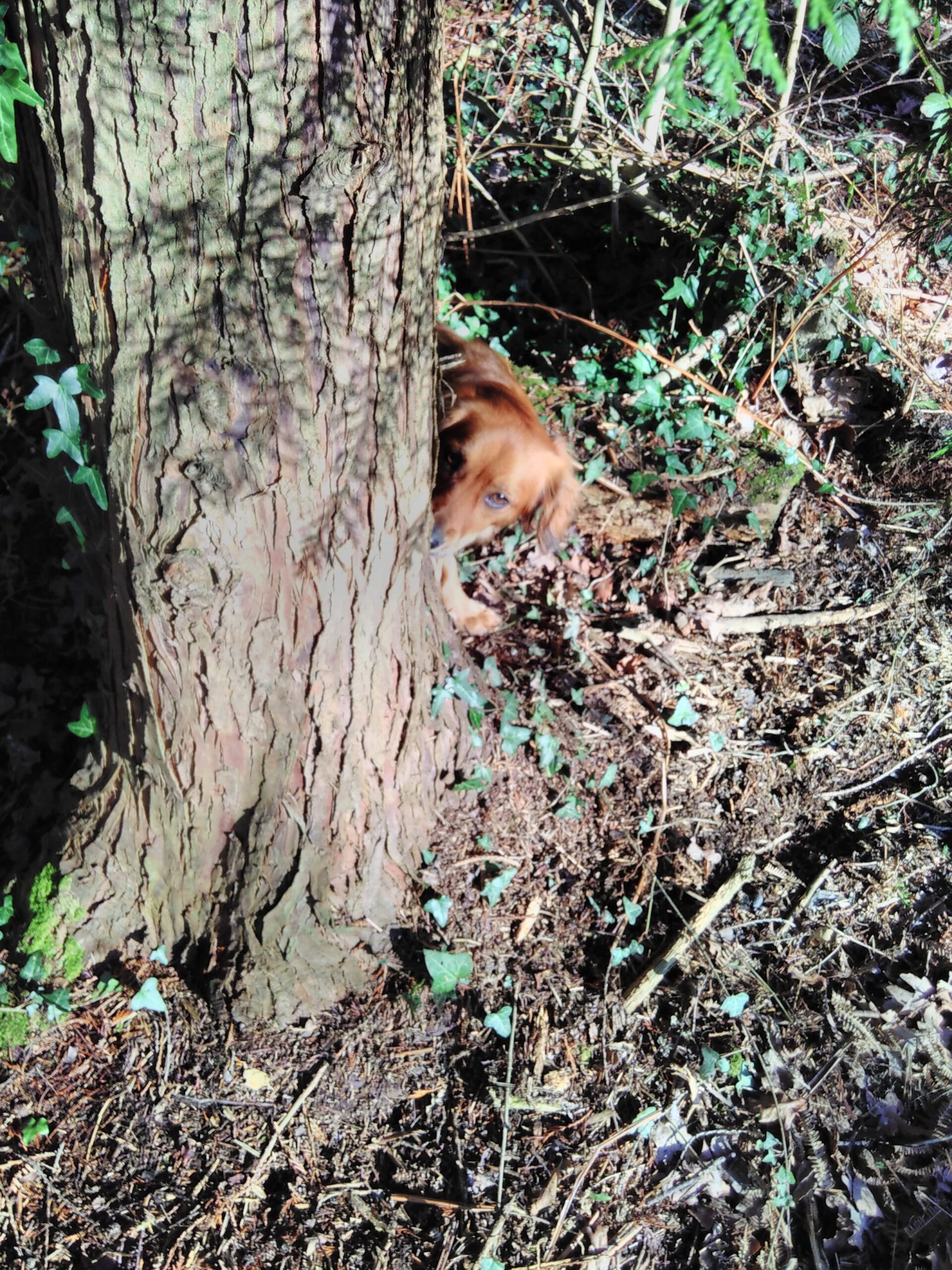
I walked the dog a lot. I loaded her into the car and took her to Firestone Copse, where I let her run gleefully through the woods as I ambled in an autonomous daze on the circuit round the main path, letting Stephen Fry’s beautiful reading of Rowling’s richly layered fantasy insulate me from any serious thought. I puffed on my vape and enjoyed bright cold or grey drizzle in the same steady happiness.
Amanda stayed busy, and was often out, buying stuff or meeting friends or family. When she had the car I took Tia through the new estate at the top of East Cowes, out of town to Whippingham village, and then along the footpath behind the church, and over the stile into the farm by the river. There I could let Tia off her lead and walk across the sodden meadow, staring down at the grey arc of the river Medina, while Harry, Ron and Hermione puzzled over the escape of Sirius Black. Tia ran great, delighted circles in the long, rough grass, stopping only to come running up to me, to collect a treat, before haring away again.
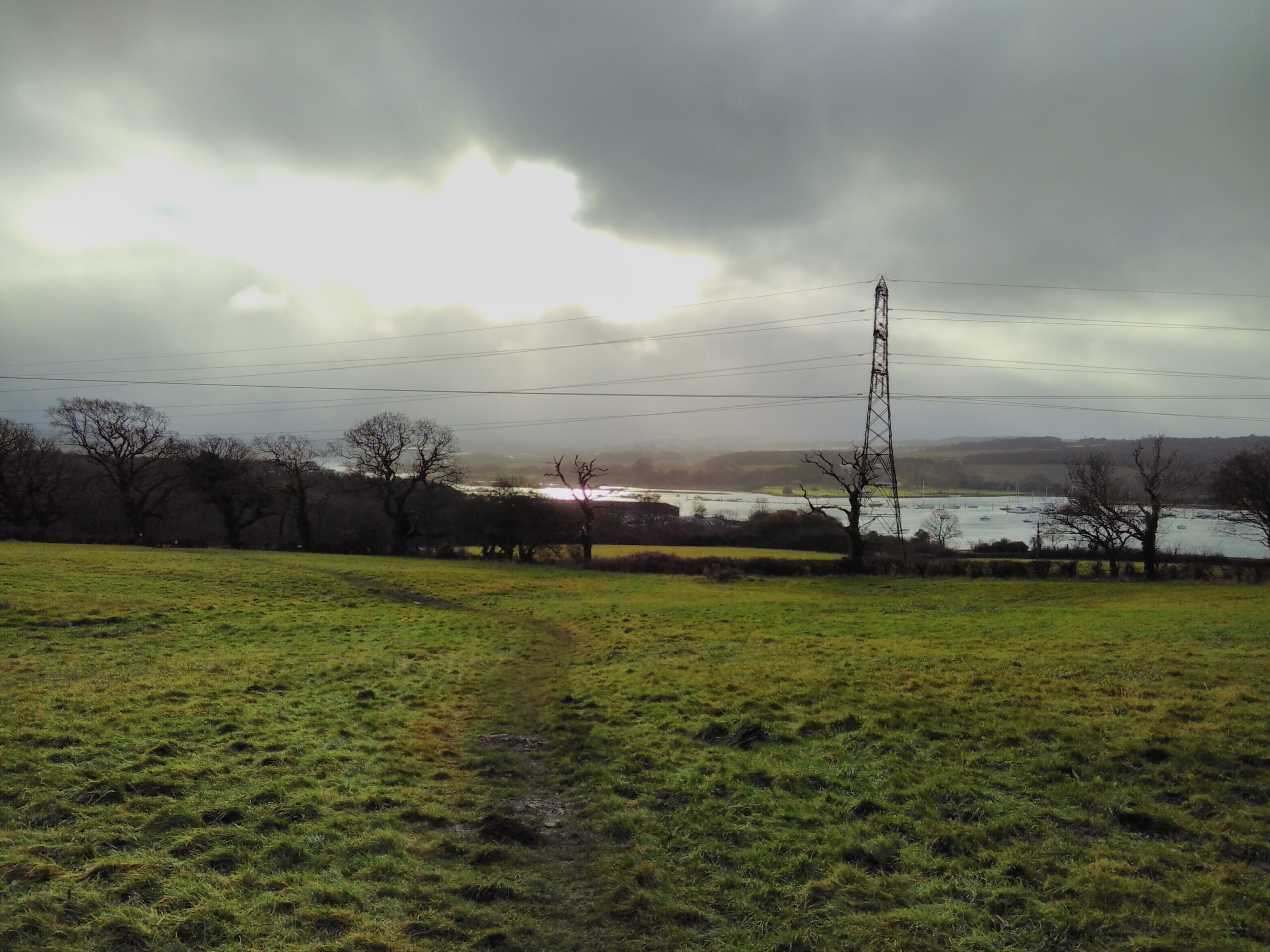
At the far end of that field is another stile into another field and, at that one’s far end is the wood with the demolished factory site, fenced off because of contamination. The woods have a poisoned character; bewitched by their pollution, but there is a path through them that leads to the road down to the Folly Inn. On a particularly heavily-clouded, drizzly morning, I went through the woods with Tia and we walked down to the pub. Inside, the pre-Christmas weekday feeling was like manufactured cosiness: I bought a pint and Tia sat beneath my chair as I drank it, lost to real life.
One afternoon, in the week before the official start of the holidays, when my boss had let me know that I could work from home, I finished updating a load of student folders and took Tia out in the mid-afternoon, with perhaps an hour and a half of daylight left. We walked along the top of the new estate, and I intended to go along to the Whippingham field, but as I crossed the road at the far end of the estate, I looked back and realised that there was a path down the final street, behind the line of trees that marks the edge of the housing before the new road. A woman was walking a dog there, and I noticed, for the first time, that the houses, modern and cramped as they are, are built in the style of Georgian town houses, in a sort of model-village style. I was intrigued. I walked back and took the dog down the road that the woman had come from, imagining that there was a village, with life and interest here, rather than a dormitory development of off-the-shelf compartment houses for people who never interacted.
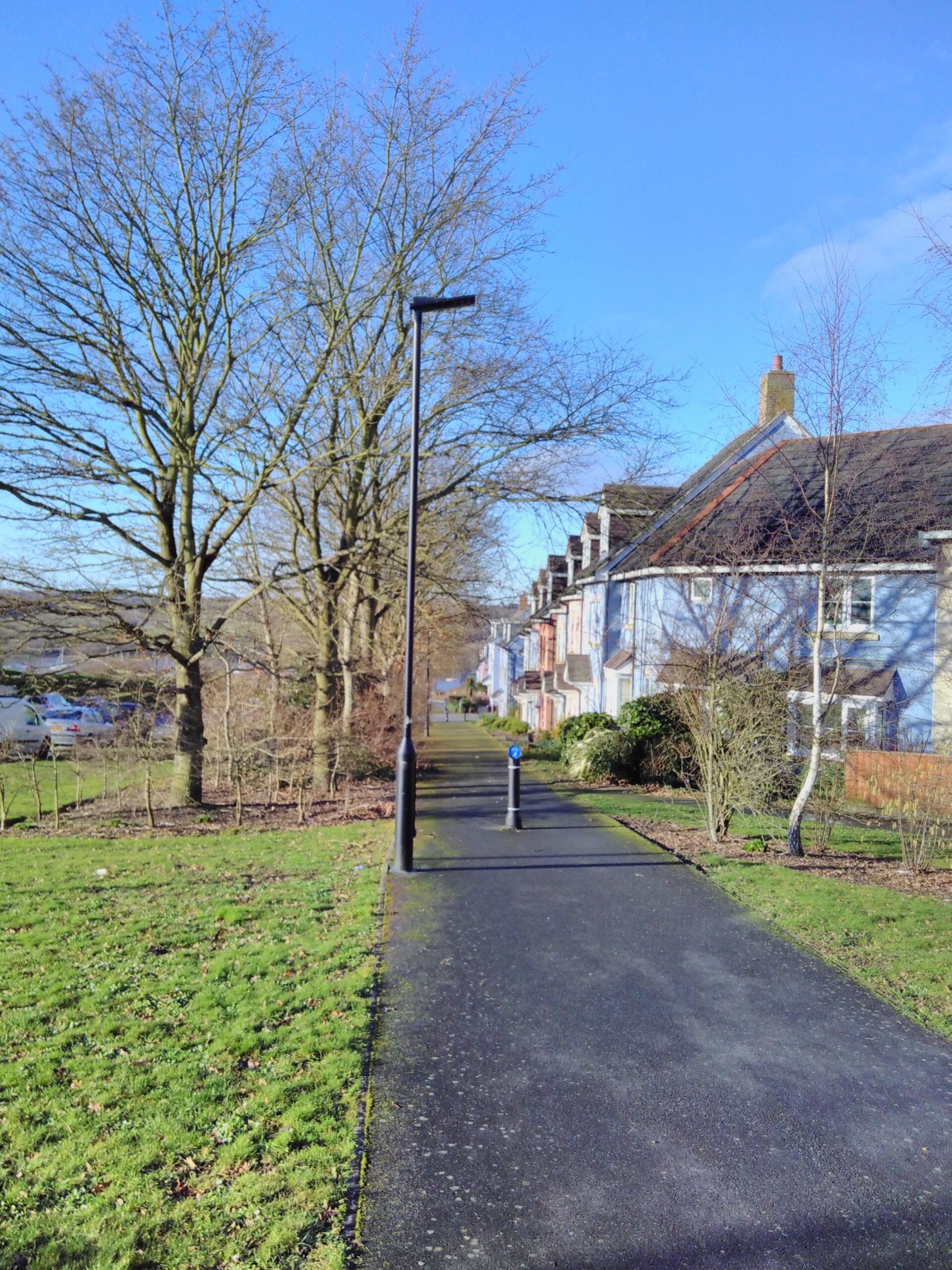
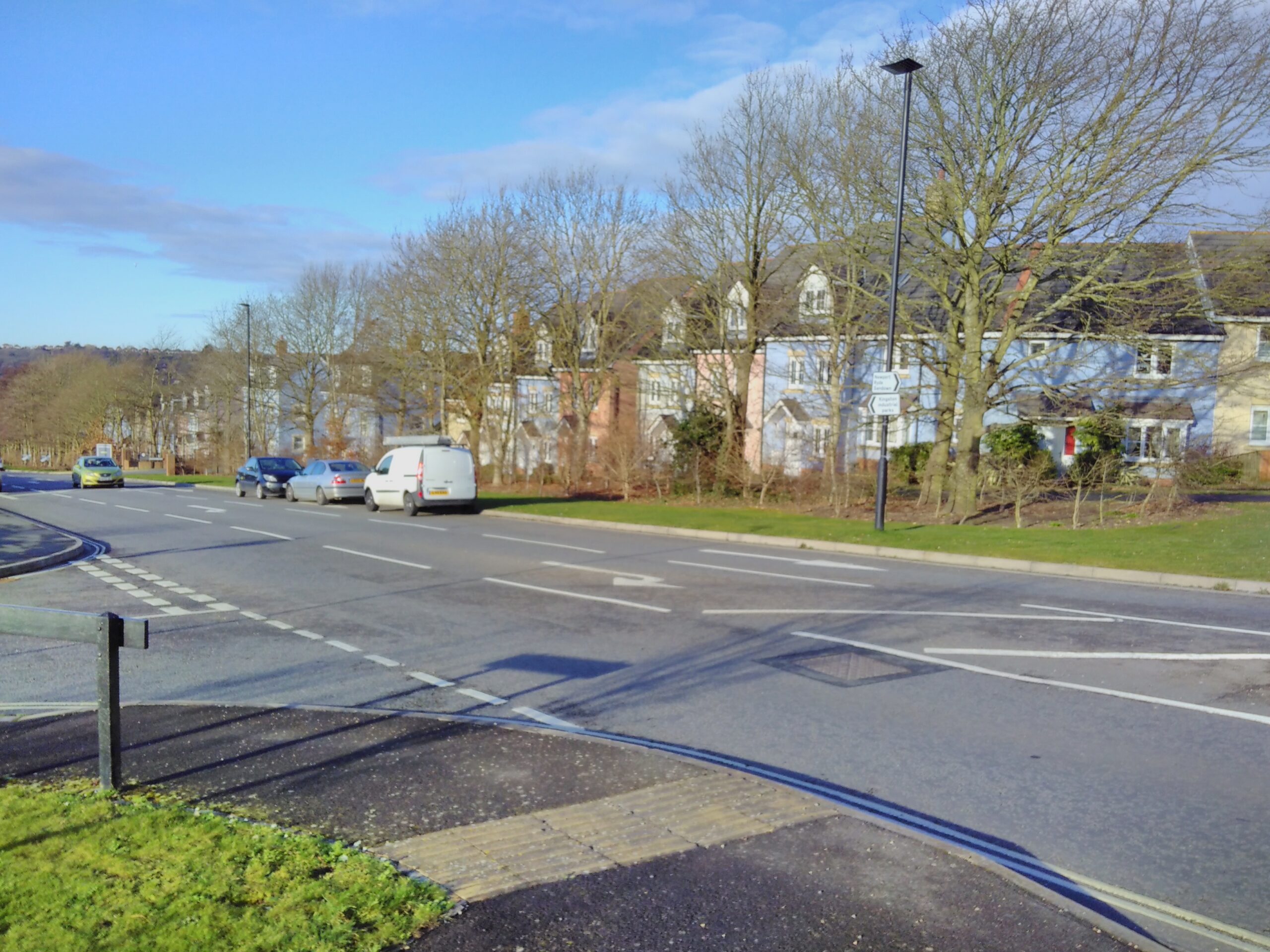
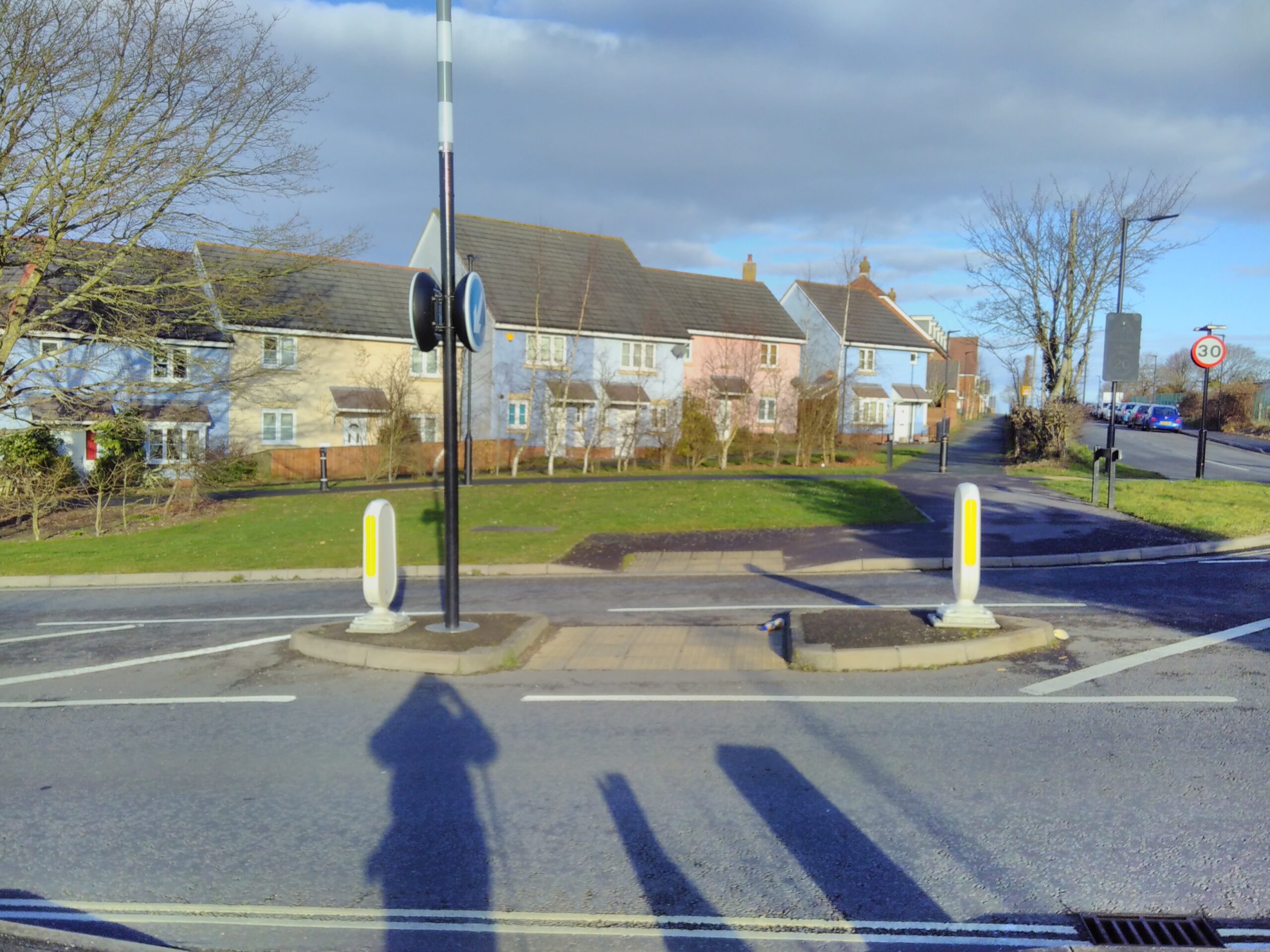
The bizarre sterility and isolation-in-a-crowd nature of the estate is belied by some clever but deceptive design. There is a fake village green, around which some fake-georgian terraced houses with attic room gables are painted in various ‘authentic’ colours, but the residents have already let the upkeep slide, so that mould is showing on the fascia and soffits, and the blue-painted houses, in particular, are looking weathered. And, apart from the occasional dog-walker, there is no one about. This is an estate designed for driving to and from. You have your allotted parking spaces and you lock your door, and you live your life away from the place where you live. There are no shops, no pubs, no church or community centre. The estate is a lot of bedrooms and TV rooms. The closest thing to a community facility are the construction business offices: Barratts, Wilson Homes and one other, whose name escapes me, maintain showrooms there, to persuade people to make their homes in this abandoned filmset of a non-community.
Harry Potter seemed to suit this bizarre environment perfectly. The place is the Muggle state in redbrick, render and wood-frame. It is even less life-enhancing than Little Whinging, in that most of the houses here do not have gardens. They have strips, with pots. There is quite a lot of artificial grass.
I became a little fascinated with the area.

Further down the new road, as it bends back along the bottom of the estate, and follows the river back towards East Cowes, there is a small development of ‘self-build’ plots. These challenge the uniformity of the rest of the estate with an alternative conformity of cuboid grandiosity, all cladding and glass. At dusk and after dark, the lives within the ones which have been completed and are occupied are on display to every passer-by. You have to remind yourself that these are private dwellings, and it is rude to look, because their lights seeps out across the road, like pollution. Wall-mounted TVs of migraine-inducing vastness make it appear as though the flatpack palaces are inhabited by two-dimensional giants. The people within might be projections; a new Google project of a pixelated populace: Homo Alexa.
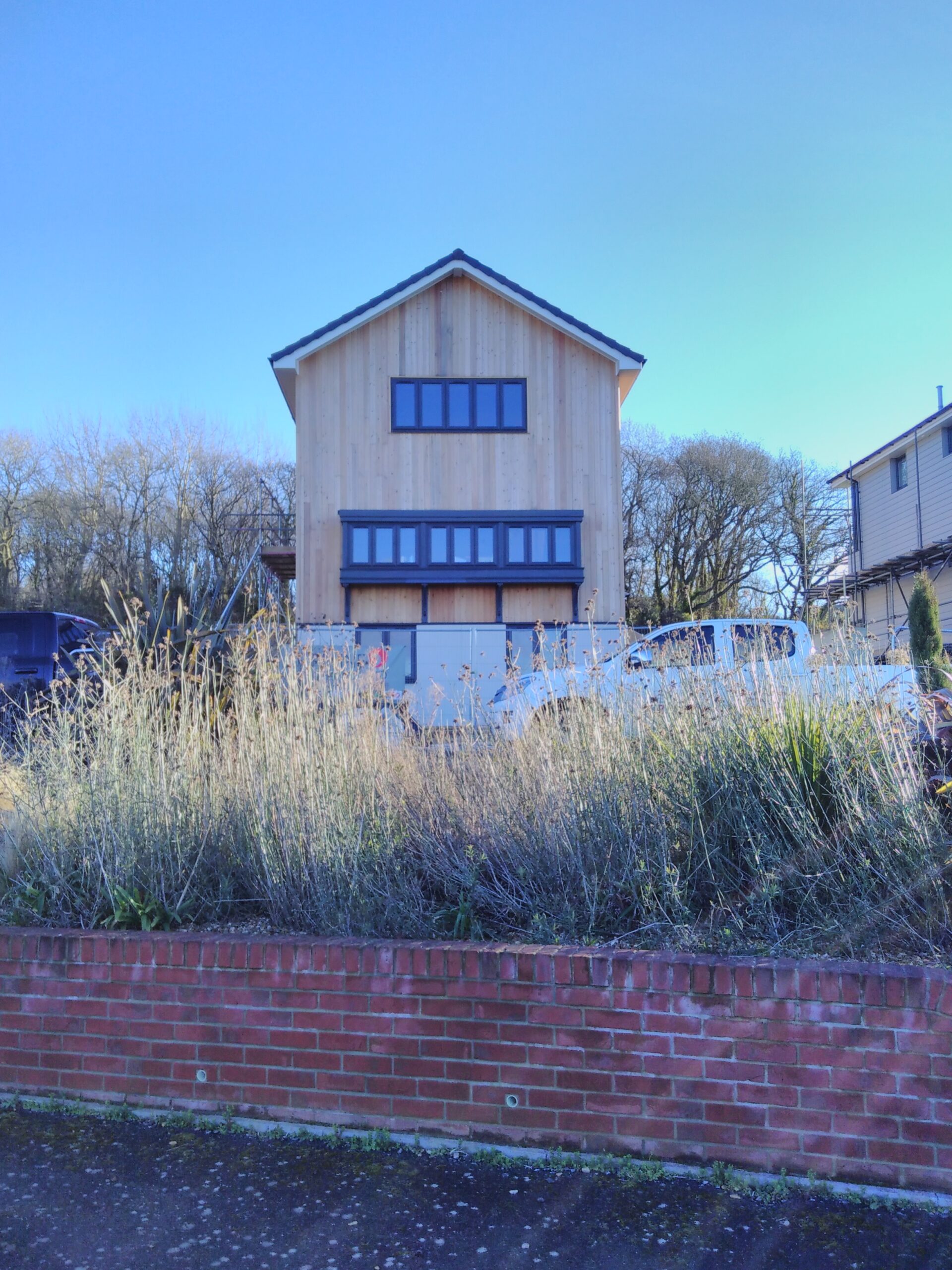
At the end of the self-build development there is one house, not yet complete, that defies the pattern, in detail if not in dimensions. Like all the others, it is a vast, three-storey cuboid block, occupying the entire space of its uniform plot, except for the obligatory multiple car parking space that replaces any garden. However, instead of the wall of windows, it is plain-fronted, with a long, Elizabethan-style gable of nine small windows. It is strange and rather beautiful, this defiance of the Grand Designs norm. It hints at a shadowed interior lit by reading lights and standard lamps, rather than LED spots: dark wood panelling and bookshelves rather than magnolia paint and flatscreen hugeness.
We walked on. The elite section, with the self build plots, is bounded on its far end by a large area of grass and woods, creating a break between that odd island of conformist cut-out creativity and the brick homogeneity of the rest of the estate. A drainage ditch that will probably be known as ‘the stream’ by generations of children who grow up in the area runs round the edge of the wood. There is litter in there: a plastic barrier section, and a fire extinguisher, barbed wire that the builders didn’t bother to remove trails through the undergrowth. I let Tia off and she disappeared into the woods. On my headphones, Harry, Ron and Hermione heard the execution of Buckbeak in horror.
Over the following week, I explored the estate. I tried to get out of the house by about half past three, although I was not putting my watch on most days, so got it wrong sometimes. Some days I took Tia out on my own, and on a few days Amanda was free and would come with me, and we might go up to Carisbrooke Castle or to Firestone Copse, but I kept drifting back to the estate. Darkness fell by four thirty, and I often walked in the dark, although I liked to be home by five, ideally, to start supper, with Stephen Fry transferred to the bluetooth speaker in the kitchen.
On New Year’s Eve, Amanda and I took a walk and I tried to explain my fascination with the place. We walked around the estate on the route I had taken on my first exploration, then, as I had done on that first occasion, we let Tia off her lead to run in the woods. Amanda became nervous when Tia didn’t come back after five minutes, so we walked around the edge of the woods, to the top, where the bottom of the main estate reaches. Tia appeared, bounding ecstatically up to us, her ears flying behind her and, instead of going back down to the bottom road, along the Medina, through the new road that is as yet undeveloped, we walked up through the middle of the estate.
Amanda’s not a Harry Potter fan, and is amused and slightly embarrassed by my enthusiasm for it, but, in the gathering dark, she listened sympathetically to my explanation of how the events of the audiobooks had laid themselves into my memories of the estate. I was close to the end of The Goblet of Fire by now, and the wonderful sense of time passing, and events piling up like lived memory that is such a strength of the series, had taken full hold of me. We held hands, in thick gloves, and our conversation drifted. We were gearing ourselves to go out for the night, which we both knew we would enjoy, but which felt like hard work just then. Neither of us was eager to get home, to get dressed and ready to go out, or to be sociable. We were savouring one another, reflecting on the lazy week we had shared and wishing that life could be like this all the time.
It was, though, a wonderful evening. Several of our friends were planning to give up alcohol for 2018. I had drunk steadily through the holiday, usually having a first whisky as I cooked and drinking a couple of cans of beer through the evening, so I was planning to do dry January. New Years Eve was, therefore, a blowout. Amy, a dear friend of Amanda’s and the wife of my friend Andy, was on particularly fine form, her gift for acerbic comedy at its sharpest. We had planned to get home early, because we were worried about fireworks disturbing Tia and the cat, but we stayed until two, playing a card game1 that I had not heard of before, but which suits the sort of vulgar humour we enjoy with our friends.
In the morning, I was hungover. Not blindly, agonisingly hungover, but low-battery and grateful for Amanda’s painkiller stash. We had arranged for Amanda’s parents to visit for lunch and so I cooked and she cleaned and we had a very nice lunch. In the afternoon, Amanda’s sister and her partner came round and we all sat in the sitting room, drinking tea and chatting. The afternoon drew on and we realised Tia needed a walk. I got my coat, scarf, hat and gloves on and left the warm family gathering to take her out.
We walked up to the rec, by the old estate, onto which the new one, which had been my weird stomping ground for the past week, has been grafted. Harry Potter was in the maze, on the final challenge of the Triwizard Tournament, still trusting the fake Mad-eye Moody, being drawn towards his nemesis and the final destruction of his childhood innocence. Half in Hogwarts, half in East Cowes, I pulled Tia into the old estate, finding my way through streets that I hadn’t visited yet, of well-established houses, with some tidy front gardens, some messy; with cars on blocks and bicycles leaning against front walls; some litter, some mess, but the clutter of an established community. I got a little lost, finding my way down a street that ended in a communal car park and a wall and retraced my steps, passing a Victorian house outside which a discrete noticeboard advertised that it serves as a residential home for people recovering from substance abuse. There was a brightly lit kitchen with posters and artwork tacked all round it, but no one there. All the same, it looked warm, protective, loving.
The road bent round, but an unpaved alley led up to the main road, Beatrice Avenue. I took the alley, which was lined with winter-bare trees, and Tia sniffed her way along it, pulling at her lead, enjoying the rich stench of litter and leaf moss. As the view ahead cleared, I could see across the field beyond, up towards Osborne House Park and, slightly dimmed by a streetlamp, a glorious moon dominated the sky. Remus Lupin leapt into my thoughts, but so did the love by which I am surrounded and the sheer luck I enjoy, to be alive, housed, married to Amanda, free to take the time to daydream and waste my consciousness on a silly fantasy like the Harry Potter books. The awareness that I would be returning to work the next day had been playing on me, but it suddenly seemed less of a hardship, and more like a privilege. I stopped to take some photos, struggling with gloves, pockets, and Tia’s excited rummaging, and these were the shaky results.
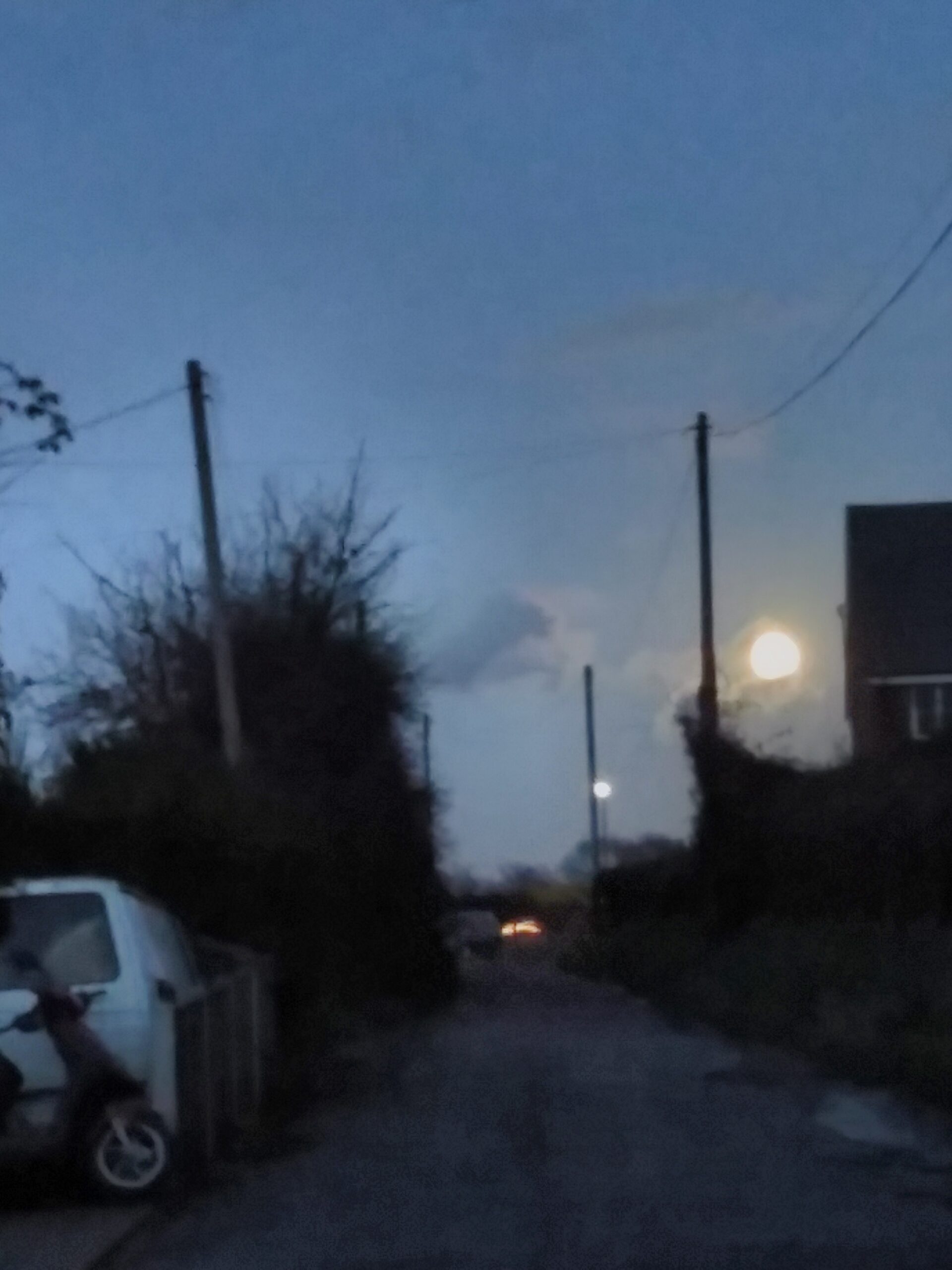
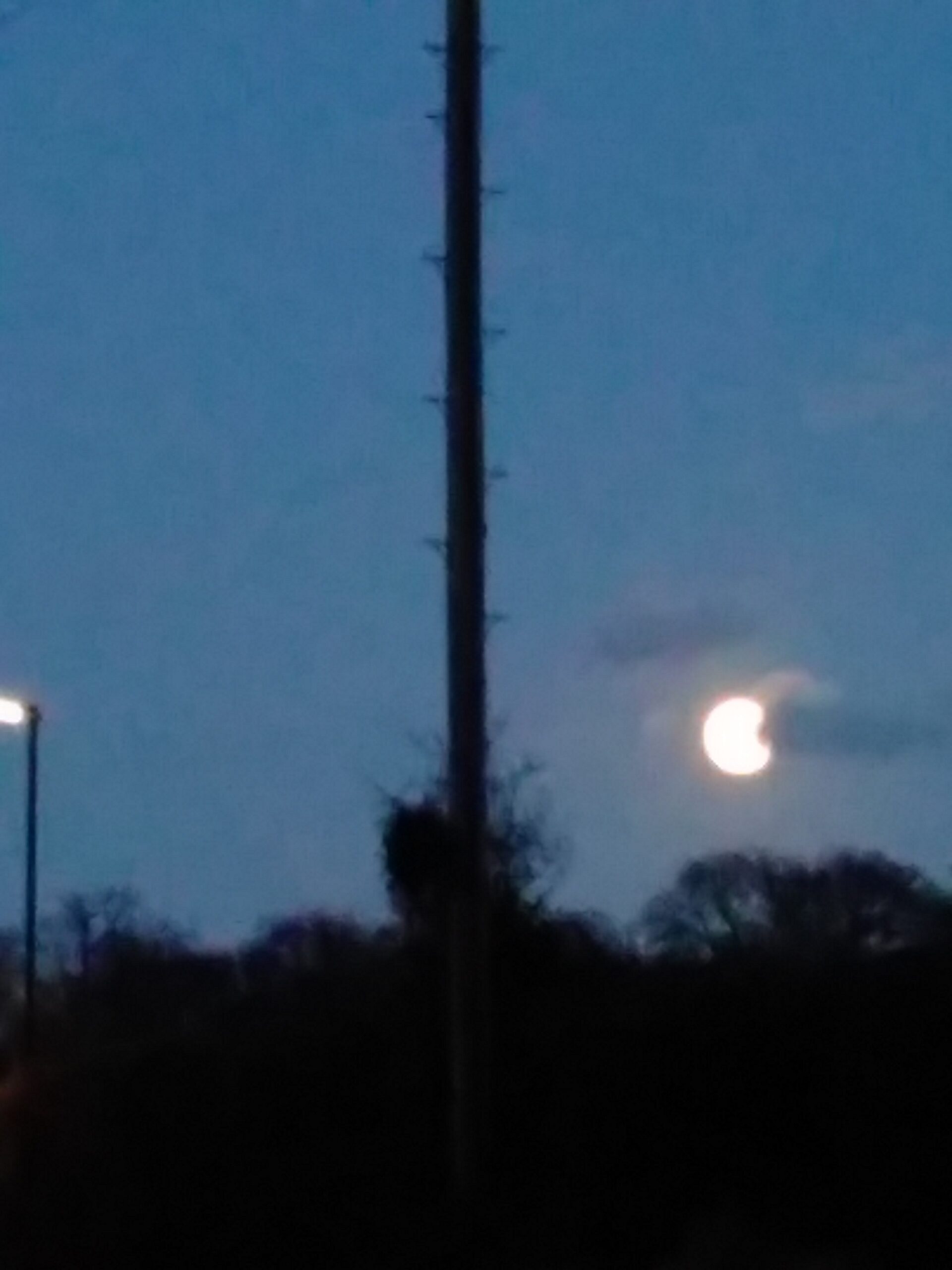
Last night, a Saturday night, the night after the first full moon since New Year and a month into my back at work routine, I made soup. I had finished the Harry Potter audiobooks in the second week of January and resisted the urge to go back to the beginning or start reading the books again. Instead, I was listening to a recording of The Daughter of Time, by Jospehine Tey,2 from iplayer, beautifully read by Paul Young.
The soup was just about ready, the bread baked. I was tasting and seasoning and I grated some nutmeg into the pan. As I do with spices, I sniffed the nutmeg pot as I put the clove back and something about the smell seemed to stop time. I was a month back, and the Christmas holiday flashed across my inner eye like a tapestry suddenly lit up: the memory of discovering the strange estate on the edge of my hometown; the precious comfort of Christmas Eve, decorating the tree with Amanda, the smell of a glass of whisky and a lit fire; the peace of walking home from midnight mass3 at one o’clock on Christmas morning; watching the new Star Wars with Iain and Jo and enjoying their friendship; the feeling of wet clothes and waterlogged ground underfoot as I trudged across the field behind Whippingham Church.
I had tears in my eyes. I thought to myself, “I’m happy,” and it seemed like a weird condition, although I do not think of myself as an unhappy person. I took the food through to Amanda, but couldn’t find a way to tell her what had just happened to me. It didn’t matter: it was good soup, and to enjoy a meal with her, in front of the fire, with the dog sleeping in the corner, was enough.
All was well.
Leave a Reply
You must be logged in to post a comment.